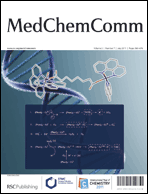 A challenge for the development of redox active metal-based chemotherapeutics is producing chemical nucleases capable of self-cleaving, so that they do not require a reducing agent to initiate DNA cleavage (which obviously limits their viability in vivo). In this HOT paper water soluble Cu2+ and Mn2+ bis-phenanthroline octanedioate complexes have been developed which are capable of doing just that – with very promising results.
A challenge for the development of redox active metal-based chemotherapeutics is producing chemical nucleases capable of self-cleaving, so that they do not require a reducing agent to initiate DNA cleavage (which obviously limits their viability in vivo). In this HOT paper water soluble Cu2+ and Mn2+ bis-phenanthroline octanedioate complexes have been developed which are capable of doing just that – with very promising results.
The self-cleaving chemical nucleases have been developed by Andrew Kellett and Michael Devereux from Dublin Institute of Technology and colleagues from the National University of Ireland, DuPont and Penn State University. The complexes show nano and picomolar in vitro cytotoxicity towards cancer cells and better drug tolerance in vivo than cisplatin.
To find out more, download the paper. This article is currently free to access and is on the cover of Issue 7.
Water-soluble bis(1,10-phenanthroline) octanedioate Cu2+ and Mn2+ complexes with unprecedented nano and picomolar in vitro cytotoxicity: promising leads for chemotherapeutic drug development
Andrew Kellett, Mark O’Connor, Malachy McCann, Orla Howe, Alan Casey, Pauraic McCarron, Kevin Kavanagh, Mary McNamara, Sean Kennedy, Donald D. May, Philip S. Skell, Denis O’Shea and Michael Devereux
Med. Chem. Commun., 2011, Advance Article
DOI: 10.1039/C0MD00266F
For the authors’ previous work why not also see:
Bis-phenanthroline copper(II) phthalate complexes are potent in vitro antitumour agents with ‘self-activating’ metallo-nuclease and DNA binding properties
Andrew Kellett, Mark O’Connor, Malachy McCann, Mary McNamara, Patrick Lynch, Georgina Rosair, Vickie McKee, Bernie Creaven, Maureen Walsh, Siobhan McClean, Agnieszka Foltyn, Denis O’Shea, Orla Howe and Michael Devereux
Dalton Trans., 2011, 40, 1024-1027
DOI: 10.1039/C0DT01607A










